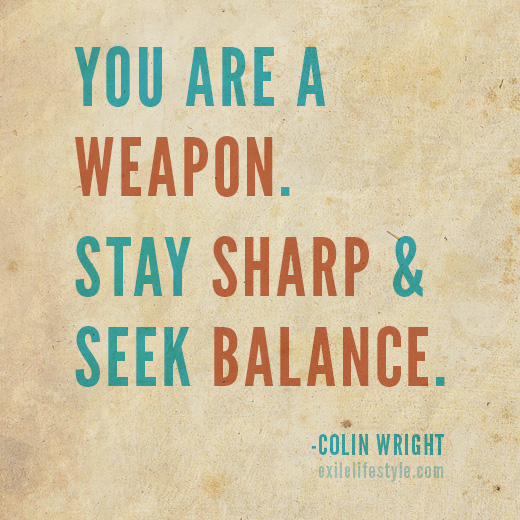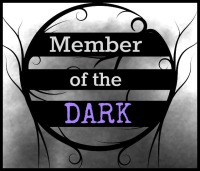
Yahoo Image Search
Betting those who visit my blog a lot saw this one coming because I usually end stuff like this talking about finding balance. Just like in real life, your characters may naturally gravitate toward a middle ground. They might be more of one side, but they still use the other in certain situations. A Thinker who doesn’t have time will depend on their instincts that have been honed through years of making plans. An instinct character who gets into a bad spot might take a moment to observe and plan to get out of the mess.
Now, you can start on one side and not have much of a problem. I say ‘much’ because you’ll always have some readers who get annoyed at a ‘reckless’ or ‘slow-acting’ hero right from the beginning. Like real people, characters evolve in tactics and habits. An inexperienced hero being all instinct isn’t far-fetched, but you can have them learn the importance of thinking. Nearly all experiences with impact have the ability to pull a person out of their comfort zone and refine themselves. You put a natural evolution on the hero that hits more than their physical abilities and powers, but the way that they use what they have.
In some ways, balance helps you do more with less. Instinct works off an innate knowledge of your own abilities while thinking allows you to analyze the situation. You don’t have to be stronger or faster than your opponent if you know your own abilities and how to use them. This goes for groups too as I explained on Monday’s posts. Many times a problem is solved by using what you have in a unique way. Heroes do this a lot since it keeps things interesting, but I will admit that it sides more with Thinker. Bashing through an obstacle instead of figuring out a way around is more pure instinct. Yet, that doesn’t mean a plan can’t be created that leads up to such an act.
The longer I try to write this post, the harder it seems to explain the nuances of finding balance between conscious planning and split second reactions. Maybe part of that is because it’s different for everyone. We all have preferences when it comes to this. Just look at how often you see authors declare to be a Pantser or Plotter/Planner. People like to pigeonhole themselves without realizing it. The truth is that we’re all probably in the middle somewhere. We lean to one side more than the other, but you can’t get very far as one side. Even a little bit of planning is needed at some point just as you need to let stuff flow naturally.
So, why do we pigeonhole ourselves and our characters? I’m not really sure since I just thought of this. Maybe because it’s easier to claim one side than to explain how we’re in the middle. If I say I’m a Planner/Thinker then you get an idea of what I do and we move on in the conversation. If I say I’m a heavy Planner who lets his Pantser instincts control the flow of the actual writing to get to his determined plot points then it’s harder to wrap your head around. Not by much, but enough that an author might not want to deal with the headache. There’s a long history of artists explaining their process and getting frustrated by the reaction.
I’ve moved away from the characters, but it does connect. We might be inclined to have a hero stick to one school to avoid the gray zones. That’s not realistic though. Very few things are black and white, so our fiction shouldn’t go that way. Yes, it makes things easier and cleaner, but it reduces the depth of the characters and world. This is why you can look at your own balance as an author and use that help flush out a character’s tactics. I mean, crafting a story can be just as harrowing as facing a dragon. More so if you’re hitting writer’s block since the dragon won’t make you suffer.





Yes! I can relate to pretty much all of this. Trying to explain my writing process, or even my thinking process gives me a headache and usually just confuses the other person. And… I hate how some people think characters should bo so predictable, when real people are anything but.
LikeLike
I try to keep my writing process explanations simple. The thinking side is another story because that just gets me into trouble. It’s like I’m speaking a different language, which never goes well when you’re talking to a boss that is pushing for a path that won’t really work.
It’s amazing how often people demand predictable characters, but then get upset that they saw it all coming.
LikeLiked by 1 person
I understand what you’re saying about speaking a different language. I feel like that a lot. I’m hoping I never have to have a boss again. Hope…
LikeLike
Same here. Hard enough explaining to family.
LikeLiked by 1 person
Ah, yes, the dreaded family. And the people who call themselves friends, and pretty much everyone. I knew early on that I belonged on another planet.
LikeLike
I’ve wondered that. Though I think I’m from an alternate dimension where reading and writing are more respected. 😁
LikeLiked by 1 person
That works too, and according to Quantum Theory, it’s entirely possible.
LikeLike
For some reason, I can’t help thinking of Riggs and Murtaugh from the Lethal Weapon franchise and how one seemed all instinct and the other all caution until they learned from each other. Riggs especially gained more of a balance.
I’m a hybrid writer–neither all pantser or all plotter. I’m definitely in the middle somewhere.
LikeLike
Great example. I think the instinct ones show the bigger changes when they evolve. The thinkers going more instinct tends to be subtler.
LikeLiked by 1 person
Yes. The hard part comes with making sure the character, while changing, still remains true to who he or she is. I heard a review of what a critic hated about Die Hard 5–that the character no longer seemed like the man he was in the other Die Hard movies.
LikeLike
I saw Die Hard 5. It was like he was a shell of himself. Didn’t feel like he was the cop who blundered into something bigger than himself and had to fight his way out. Almost like Willis was playing McClaine merged with his character from Red.
LikeLiked by 1 person
Good point. While I liked Red, I don’t think making him invincible in Die Hard 5 was a good change.
LikeLike
Why do people seem to want invincible heroes until they get them?
LikeLike
I really hate it when you have an intelligent character but they only seem to be able to use common sense when they are in familiar territory. It’s like they can’t survive or even think in a new area they haven’t explored before. Why do authors seem to do that? Is it because they haven’t planned the geography out well enough to know what they are doing and that reflects through the character?
LikeLike
I think I get what you’re saying. A lot of it seems to stem from wanting to throw the know-it-all characters off-balance. This is a blunt and clumsy way of doing it because common sense gets ignored. If it came with a sudden onset of severe doubt then it would make some sense since emotions can override intelligence. Sometimes the rules are different enough that their prior knowledge is useless, which make them react poorly.
LikeLike
There have been many great character arcs that move the character from one bookend to the other. Good post about this.
LikeLike
True. It does get weird when they go from one extreme to the other though. Could be more realistic than getting to the middle so easily.
LikeLiked by 1 person
They all need to leave their comfort zone somehow. Maybe they flirt with the far side, then come back to the middle on occasion.
LikeLike
All they have to do is survive the comic strip cows.
LikeLiked by 1 person
There is no cow level in Diablo III, at least that’s what they said. I found it though.
LikeLike
I remember stumbling into it too.
LikeLiked by 1 person
I think it is natural for a character to rely on what he/she knows even in an unfamiliar situation. I’m thinking of Harrison Ford shooting the guy wielding the swords. Harrison didn’t know anything about swords but did have a gun. I find it uncomfortable when a character does unusual stuff just cause conditions change.
LikeLike
I can’t think of that scene without remembering the story of Harrison being sick. He did a take where he just shot the guy and it stuck. Not sure if true or urban legend though.
LikeLiked by 1 person
I remember that story. A good one.
LikeLike
Reblogged this on Author Don Massenzio and commented:
Check out this post from the Legends of Windemere blog on the traits of the balanced hero
LikeLike
Thanks for the reblog. 😁
LikeLiked by 1 person
My pleasure.
LikeLike
Pingback: Writing Links 8/14/17 – Where Genres Collide
A great post, it made me stop and think about how my characters react. 🙂
LikeLike
Thanks. Glad you enjoyed it. It did the same to me. 😁
LikeLike
Pingback: A Brief Guide To A Fantasy Arsenal | Nicholas C. Rossis
Pingback: A Brief Guide To A Fantasy Arsenal – Allison D. Reid